

Glow Scotland blog
 Join the Tron Theatre Glasgow Panto characters for a live Glow Meet.
Join the Tron Theatre Glasgow Panto characters for a live Glow Meet.
Mister Merlin’s magic is mince if he doesn’t have his wand – a family heirloom handed down through many Merlin generations. The Great Bahooky’s magic has always been mince – so stealing Mister Merlin’s wand, helped (or is it hindered?) by his side-kick Bumble, is part of his cunning plan for wizard world domination.
What he didn’t bank on was Merlin having a guardian angel, in the guise of The Govan Fairy; or two plucky puppet pals Peter and Penny prepared to brave Clabber Castle’s haunted garden to get the wand back.
You will be able to meet the cast, ask them questions and find out all about the magic of Mister Merlin. -
Sign up now and join us in Glow TV on Wednesday 21st December from 1.45 - 2.30pm.
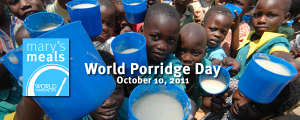 NEW TIME - 10 am, Monday 10 October
NEW TIME - 10 am, Monday 10 October
World Porridge Day is a celebration of a traditional Scottish dish and the chance to explore the work of the charity Mary’s Meals.
To many in the UK, porridge is a hearty breakfast, but to over 479,000 school children in Malawi who receive a daily mug of maize-based likuni phala from Mary’s Meals, it is a powerful incentive to go to school, and the only guaranteed meal they will have each day.
Join 200 S1 pupils in Holyrood Secondary School Glasgow as they are served porridge at the same time as pupils at the Catholic Institute Primary School in Malawi with a live link via Glow. Tell us how you are celebrating World Porridge Day and find out exactly what World Porridge Day means to the pupils in Malawi.
Mary’s Meals provides a daily meal to chronically hungry children to attract them to school where they can get an education which could lift them out of poverty in later life. It costs Mary’s Meals just £6.15 to provide a daily meal for a child for a whole school year.
Studying the lives of the children supported by Mary’s Meals provides a rich interdisciplinary context for delivering many aspects of the modern curriculum including global citizenship, religious and moral education and enterprise.
To sign up and join us for World Porridge day on Glow TV click here
More Have you ever wondered what goes on behind the scenes at a National Theatre, who does what and how is the whole production put together?
Have you ever wondered what goes on behind the scenes at a National Theatre, who does what and how is the whole production put together?
Why not join us for a sneak preview behind the scenes of National Theatre of Scotland’s seminal production of “Men Should Weep.”
Join the directors, cast and crew members of the Men Should Weep company live from the citizens theatre. A tour of the set led by assistant director Phil McCormack will be followed by discussion with the director and some of the main cast who will reveal their approaches and the many processes adopted to make the show.
You will also have the opportunity to ask your own questions and find out what really goes on behind the scenes.
Register for Glow TV and then sign up and join us on Thursday 22nd from 2-3pm for this exciting event.
MoreThis week P3 and P4 pupils and teachers from 20 Glasgow primary schools experienced their first Glow Meets as part of the ‘Don’t Start Me!’ project.
Teachers have been using resource materials from the project Glow group to prepare their classes for a visit from TAG later this month, when they will see a live performance exploring how violence and crime can begin.
This Tuesday, pupils were able to meet the cast and director of the play, look behind the scenes at the Citizens Theatre and see rehearsals in progress. There was plenty of time for questions and answers, and pupils enthusiastically asked the actors about their roles and the storyline, how they got to be actors and their lives working in the theatre.
During the week, pupils have been creating their own character cards, completing comic strip captions and using role play to explore the issues and emotions arising from the story, sharing photos of their work on the Glow group.
On Thursday, PC Geoff Smith from Strathclyde Police Anti Violence Unit joined the schools via Glow Meet to talk about his work in Glasgow’s East End. PC Smith was interviewed by Angela Smith, Education Officer at TAG, and talked about every aspect of his job, including his uniform and the equipment he carries, demonstrating how handcuffs work on Angela! Pupils had lots of good questions to ask and found out that the best tool in difficult situations is a calm voice and that police cells and prison breakfasts are definitely to be avoided.
The ‘Don’t Start Me!’ tour begins in Glasgow schools on Monday 24 January.
Co-Create is funded through a partnership between Learning and Teaching Scotland and theCreative Scotland National Lottery Fund.
This term, TAG, the learning department of Citizens Theatre, is working in partnership with Strathclyde Police and 20 Glasgow primary schools on ‘Don’t Start Me!’, a project which explores where crime and violence begins.
P3 and P4 children from the participating schools will see a play in which a 9 year old boy, Craig gets involved with his older cousin Johnny’s gang, resulting in serious consequences for Craig and his classmates.
Prior to seeing the play in their schools later this month, pupils and teachers are becoming familiar with the play and its characters through the Don’t Start Me! Glow group, which contains a growing body of resources for pre and post performance activities.
Pupils are invited to find out about Craig, his mum Sandra, his sister Jamie Lee and cousin Craig by reading character cards for each of them. They will then create their own character card and share it via Glow. In another activity, pupils will create a comic strip depicting a scenario from Craig’s story.
Through Glow Meet, participants will be able to watch a rehearsal and meet the actors and an officer from Strathclyde Police anti violence unit, who will talk about the issues raised by the play.
Don’t Start me is one of ten Co-Create demonstration projects, where arts organisations are working with schools and other partners in order to explore the possibilities of using Glow to develop new resources and new approaches to learning and teaching.
Co-Create is funded through a partnership between Learning and Teaching Scotland and the Creative Scotland National Lottery Fund.
More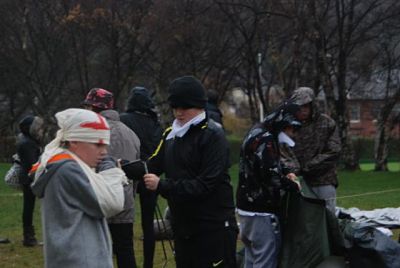
On the final day of State of Emergency, S2 year groups from all seven schools came together via Glow Meet to share their learning experiences from this intensive week of activity.
Tarbert Academy journalists gave a live report on the conflict as news broke in the west of Scotland. Their broadcast was interrupted when freedom fighters broke into the newsroom in protest against the government regime.
A Bathgate Academy human rights campaigner gave a powerful speech about the importance of integrity and trust.
During the week, Lochend Secondary pupils had explored war poetry in English and code breaking in Maths. In Drama they’d made a film about a boy who wanted to join the army and in PE they’d learned what it might feel like to be in the army as they were made to run outside in the cold!
Clyde Valley High had a visit from the Red Cross and found out about refugee camps; they created Facebook pages and video messages for viral communications; they made images of war by acting out and photographing scenes involving rebels, civilians and government soldiers.
The Army marched into Cumnock Academy hall and set up an assault course – the highlight of the week for the reporters:
“It was amazing, great fun – I didn’t come first but I did enjoy it!”
“It helped build my confidence”.
They also had visits from the Red Cross and a Human Rights lawyer and learned that everyone has rights to equality and protection. Pupils had purified water in Science, and designed and built devices to transport black market goods through underground tunnels in Technology and Art.
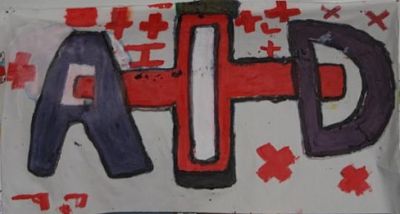
At Greenock Academy aid workers had training in basic first aid and learned to cook nutritious meals with limited supplies. The army launched a search for a missing soldier and through constructing a refugee camp, they learned team work, how to filter water, make up ration packs and distribute food to refugees.
Holy Cross High reported that propaganda was rife, with posters put up around the school by both factions; normal lines of communications had been destroyed. The Department of PE had transformed soldiers into ‘lean, mean fighting machines’ in Sniper Alley; the Department of Technology investigated ways of disposing of human waste; the Department of Social Studies researched the causes of conflict, whilst the Department of Drama explored the motivations of those involved.
State of Emergency has clearly been an amazing experience for both pupils and staff. I would encourage you to visit the Glow Group to read pupil diaries about their learning, look at more photographs of cross-curricular activities and see the rich variety of resources shared by participating teachers. This really has been Curriculum for Excellence in action.
Co-Create is funded through a partnership between Learning and Teaching Scotland and the Creative Scotland National Lottery Fund.
Image credit: Kath Morley, Greenock Academy
MoreThis project is so rich that it is impossible to fully reflect the depth and breadth of the activities and learning taking place in seven secondary schools across Scotland.
Today I went out to visit Cumnock Academy in East Ayrshire where staff have embraced the project and as well as designing an exciting timetable of activities for S2, have created opportunities for other pupils, such as the higher media studies students who are recording and reporting on the week’s activities, and the S6 pupils who are helping S2 build emergency shelters.
I arrived in time to join pupils in the hall to watch the fourth and final webisode. They were totally engaged and focused as the drama reached its sad and shocking conclusion. The atmosphere was palpable as pupils silently started to take in and make sense of what they’d seen.
The online dramas have provided the stimulus for the week’s activities and have generated deep discussion and raised big questions. Some of the pupils later engaged in a conversation with a group at Tarbert Academy via Glow Meet and had a serious debate about the motives behind different characters’ actions. Would they have stolen food if they were freedom fighters? Did they think being an insurgent would put their family in danger?
Yesterday, a Human Rights Lawyer visited the school as an expert witness. He was surprised by the pupils’ depth of knowledge, their insight into conflict situations and the challenging nature of their questions.
Participants have explored the physical, ethical and political issues and challenges thrown up by conflict and they have seen the relevance and connectivity of learning across the curriculum. The project has provided a stimulus for learning and a platform for creative response. The impact of State of Emergency looks set to be long lasting.
Co-Create is funded through a partnership between Learning and Teaching Scotland and the Creative Scotland National Lottery Fund.
Image credit: Eoghann MacColl, Cumnock Academy
More
“This is an act of peace not war”, the politician announces in a TV news broadcast as government troops are mobilised for Operation Democracy – “the aim, to disable the unelected regime and restore democracy”. The reality for State of Emergency narrator Chloe is chilling – she is able to watch military strikes online whilst her own building shakes.
So began day three of State of Emergency, an intensive week for S2 pupils in seven schools, exploring the dilemmas and complexities of war, supported by Visible Fictions Theatre Company, and using a project Glow Group to share information, ideas and resources.
At Greenock Academy, staff and pupils have been living out a conflict, using role play to explore issues faced by refugees, soldiers, journalists and politicians.
“We don’t belong anywhere and we can’t trust anyone. We don’t want to fight, we just want to go home.” S2 ‘Refugee’ Pupil to Journalists, Greenock Academy
Clyde Valley High mathematics pupils were faced with the challenge of constructing new bridges to transport supplies over the Clyde after a bombing raid had destroyed the existing ones. They also learned how to make and break codes.
With the threat of shortages caused by the conflict, home economics pupils investigated what food supplies would be needed and where to locate them. At Bathgate Academy, the dining staff are involved too – their State of Emergency lunch time menu includes a ‘No deliveries’ day, with store cupboard ingredients only, and ‘No power or cooking facilities’ day when only cold food will be available.
“Its exciting, really different from normal school” S2 Pupil, Clyde Valley High
“We could have done a whole month on this”. Teacher, Lochend Secondary
Co-Create is funded through a partnership between Learning and Teaching Scotland and the Creative Scotland National Lottery Fund.
Image credit: Julie Austin, Lochend Secondary
More
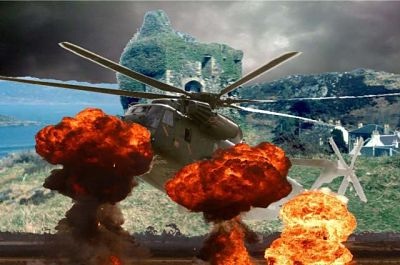
“The first victim of war is the truth”, The journalist’s view – Greenock Academy
Day two of the project and the second State of Emergency webisode starts to bring home some of the realities and complexities of war. What would it be like to live in a war zone?
Pupils and teachers have been engaged in challenging and thought provoking discussions…….What are the differences between needs and wants? Which version of a story is the truth? What is it like to live in a refugee camp? Who is right – the government or the freedom fighter?
Each school involved in the project is using conflict as the focus for learning and teaching, exploring war from both subject specific and interdisciplinary perspectives. Pupils at Tarbert Academy have created their own images of what war might look like for them; Clyde Valley High have been discussing war art and the deeper meanings hidden within it. At Bathgate Academy, pupils are working in groups to write their own blogs or online diaries about their learning experiences. At Greenock Academy, the resource centre has been converted into a field hospital and physical borderlines have been created in the school.
One thing is certain– this week is providing many participants with a completely new experience and way of working that is all engaging.
“Day one is over. Two webisodes down and not a technology disaster in sight! Now I know why we say “lines of communication”, how fast soup can be cooked (or not). The young people are engrossed in the fight for freedom. Can’t wait for Sniper Alley tomorrow….” Teacher, Holy Cross High
Male pupil: Miss, see in maths- are we gonnae dae that State of Emergency thing tae? Maths teacher: Yes we are Male pupil: Yabby dabby dabby do! Conversation, Lochend Secondary
For an overview of the project read the recent TES article and visit the State of Emergency Glow Group.
Co-Create is funded through a partnership between Learning and Teaching Scotland and the Creative Scotland National Lottery Fund.
Image credit: Pupil, Tarbert Academy
More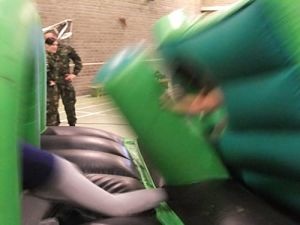 “This film is about what’s going on in my city, right now”…..
“This film is about what’s going on in my city, right now”…..
For S2 pupils in seven secondary schools, this week began with the first of four webisodes about conflict. Each day, they will learn about the crisis and dilemmas faced when a city is transformed into a war zone.
Over the last few months, teachers have been working together with Visible Fictions theatre company to share ideas and plan activities for this intensive week. The State of Emergency Glow Group is the central collaborative space for all participants; it contains an amazing bank of documents and information on war and related issues, with materials relevant to all subject areas and aspects of the Curriculum.
Now State of Emergency has begun, schools are uploading images, videos and diary entries about their experiences and their learning. Here are just a few entries from Day One:
“Red Cross and Army came through as did staff in school….Loads of discussion, design of emergency shelters, building emergency shelters, army assault course, science dept filtering dirty burn water through socks, tights, sand and other things and the webcasts - first class. We also had our own STV newsdesk presentations personalising the state of emergency to Cumnock. Roll on day 2..”
Teacher, Cumnock Academy
“We started playing games to get to know each other. We then got into groups to discuss the film we watched in the morning, we also discussed what a state of emergency is and the things we would need if this happened. After lunch a police officer came into the school and showed us their equipment for a riot and a state of emergency. We got back to class we talked about the difference between needs and wants, we came to a conclusion about healthcare, basic food, childcare, water and shelter as our basic needs. Transport caused us come debate but in the end we decided in was a need because our legs are a type of transport too. Nearer the end of the day we talked about world war two, rationing, the dig for victory and make mend and do campaigns. Pupil, Bathgate Academy
And from a teacher in Greenock Academy:
“We thought we’d struggle to fill three days, now we think we could keep this running for two whole weeks”
For an overview of the project read the recent TES article and visit the State of Emergency Glow Group.
Co-Create is funded through a partnership between Learning and Teaching Scotland and the Creative Scotland National Lottery Fund.
Image credit: Eoghann MacColl, Cumnock Academy
More
Find us on